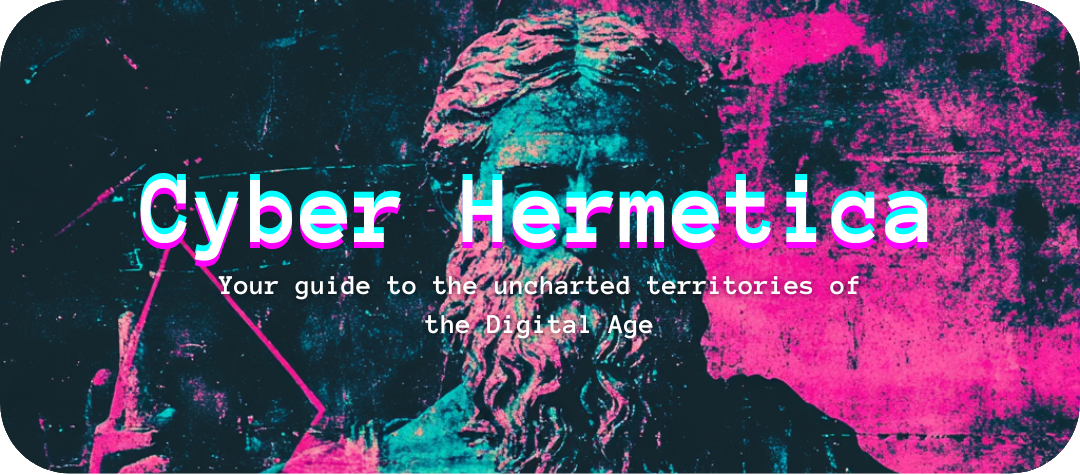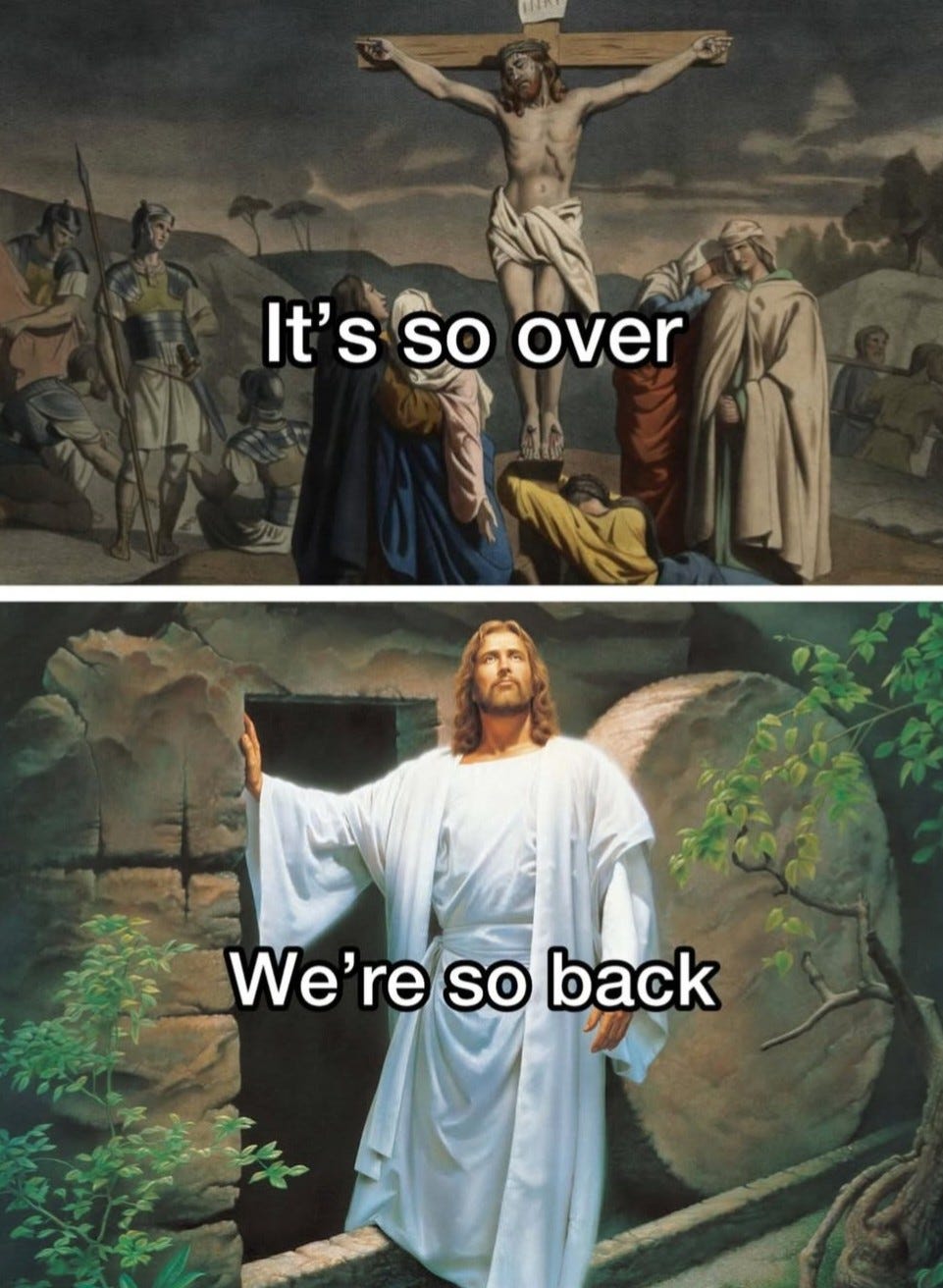Hi there, I’m Matte. Privacy & cybersecurity professional by day, schizo-cyberoccultist by night. Every sunday I bring you a weekly dose of schizophrenization, blending insights into the Digital Age, echoes from the past and digital survival tips. If you like this, you will also enjoy the rest of Cyber Hermetica!
Happy Easter!
⚡ SEMIOTIC FLASHES
Personal weekly considerations. Decrypting meaning, one flash at a time.
Education and Slavery in the Age of Acceleration
Today is Easter, and I've been at my parents' house for a couple of days. We don't often spend Easter together anymore, but this year we made an effort. They've become grandparents and we've become parents, so it seemed like a good opportunity to spend some time together.
Among various discussions, we spent a heated half-hour talking about education. My experience with school has been dramatic: from elementary to university, I never found useful support in the public education system, which I found oppressive, sclerotic, and unnecessarily prolonged.
Most people from Gen X and the Baby Boomer generations justify the school system as a means of equalizing opportunities across social classes through education and socialization. My view is that at best it's an extremely efficient parking lot for children and adolescents, while their parents spin their wheels within the capitalist system. But nobody wants to say this out loud.
Public schooling is a relatively recent invention in human history—a product of the progressive-Protestant revolution of the late 1800s that led to the so-called Welfare State. The Encyclopaedia Britannica describes it as “a government concept in which the state plays a key role in the protection and promotion of the economic and social well-being of its citizens. The welfare state usually includes services such as public education, public healthcare, and public housing.”
From 1840 onward, in North America, there began a concerted infiltration of government at all levels by progressive-Protestants who firmly believed in the paternalistic role of the state and the imposition of mandatory morality within society.
For them, government was a redemptive tool used to correct, organize, and plan society, ensure social justice, and eliminate every sin from the face of the earth. The goal was to create a fairer world and thus fulfill God’s will: "God works through the State and thereby universally carries out his will better than any other institution," they proclaimed.
Among their goals was to "Americanize" immigrants and "Christianize" Catholics—replacing parochial Catholic schools with state-run schools.
Another invention of the welfare state was social services, the institution empowered to remove children from families deemed unfit to raise the new generation of citizens. Viewed closely, the goal of public education is similar: alienating children from the ideas, traditions, and principles of their parents, replacing them with the ideas, traditions, and principles of state bureaucrats and teachers (paid servants of the former). Additionally, schools provide a mass of notions which, beyond basic reading and writing skills, rarely make a significant difference in a person's life.
Schools, like all respectable bureaucratic institutions, haven't fundamentally changed since 1840. However, the digital revolution of the last 20 years has revealed all its inadequacies. Those who don't see it are simply choosing not to. Replacing blackboards and white chalk with projectors and tablets is certainly not enough.
First the internet, and now artificial intelligence, have opened all the doors to knowledge, allowing each of us to explore without seeking permission. The rote learning method of human culture cannot compete with the potential of autonomous learning. A child guided by curiosity will undoubtedly be happier and more balanced than a child forced to suppress their individuality, imagination, and curiosity to absorb the curriculum set by bureaucratic ministries.
Some might argue that rote education is necessary to integrate into society and find a job. Certainly true. The system—as every bureaucratic system—is designed to perpetuate itself indefinitely. Attending school creates the class of citizens necessary for the continuation of the state Ouroboros.
Indeed, schools do not teach people how to be human or to live humanely, pursuing their passions and aptitudes. Schools teach people how to become subordinate workers. Not even entrepreneurs—a class ambiguously tolerated (and therefore regulated and taxed) by bureaucratic states due to their ambition and creativity—but subordinate workers unable to live outside the system. Incapable of providing for themselves, unable to envision a world outside the 9-to-5 schedule, five days a week. Extremely efficient at finding satisfaction in consumerism and following rules.
I know there are more and more people out there who think like me. I don't have a solution, but I believe the education of future generations must be fundamentally rethought. We are entering a hyper-accelerationist historical period where the capitalist environment will become increasingly less human, and our very humanity will be questioned.
In this context, with digital oracles and robots replacing us in most subordinate jobs, what sense does it make to stuff children with facts?
Instead, they will need ethical (and aesthetic, as a friend of mine would say) guidance; to learn linguistics—the tool to program reality—and to understand the significance of philosophical thought (not just the history of philosophy). They should engage in theurgy as a practice of dialogue with their unconscious creative energies; in cybernetics, studying and mastering biological-artificial complex systems—developing an awareness of the Promethean, yet also Ahrimanic, seductive and hyper-rationalizing spirit of technology.
Certainly, a proper school should also teach how to escape from the bureaucratic System, in every sense.
💻 DIGITAL GRIMOIRE
Digital survival tactics: OpSec, Cybersec, OSINT, and AI tools to dominate the Digital Age.
Discord: Very Bad
In Australia and the UK, Discord, a platform popular especially among gamers, is beginning to experiment with identifying users through document or facial scans. The aim is to verify users' age to comply with government regulations designed to "protect minors online." You already know the pretext: it's always the same. In reality, identifying minors online does nothing to protect them (from what?) but rather endangers their identity, gathering biometric data and documents into databases that will inevitably be breached.
Discord has always been a privacy nightmare. Besides requiring extensive personal data to create an account, Discord collects and stores all logs and metadata from chats, retains IP addresses, geolocation data, and logs of user activities.
And there have already been issues. In 2024, Discord admins blocked an organization that had scraped over 4 billion messages linked to approximately 620 million users from more than 14,000 servers. This information was later sold and shared with law enforcement, AI software houses, and anyone wanting to spy on their contacts.
Avoid this platform if you can.

📡 DIGITAL SOVEREIGNTY SIGNALS
Transmissions from the infosphere: events and news that impact our digital reality.
Ahriman Ascending, the Technocratic God
Often, as today, I speak of the "Ahrimanic spirit" of technology. Rudolf Steiner described Ahriman as a spiritual entity representing the force behind technocratic materialism, transhumanism, and the reduction of humans to soulless biological machines—unwitting slaves of materialism. Ahriman seduces humanity with cold scientific and technological rationality, promising material progress and power over nature.
Here's an interesting thread on the topic.
🌐 SUBSTACK’S SUBNET
Emerging voices: articles and contents on Substack, handpicked by me to inspire and connect.
The Image Stage of Civilization
The article offers a profound (and complex) philosophical reflection on the ontology of simulation, media, and retrocausality, employing theatrical metaphors, symbolic imagery, and cultural references (such as Tron) to articulate a complex theory of reality and digital contemporaneity.
The internet is depicted as a global system producing symbolic imagery distributed everywhere. This process preserves global dominance structures, answering a call from the future, yet never revealing the true structure that creates and disseminates these images. For this reason, nothing ever truly changes.
Perfect for pondering and digesting lunch.

📟 RETRO-ACCELERATION
Fragments of retro-acceleration: cypherpunks, cybernetic cults, hacker zines and forgotten digital prophets.
“Once men turned their thinking over to machines in the hope that this would set them free. But that only permitted other men with machines to enslave them.”
— Frank Herbert (Dune)
🌀 SYMBOLS
Memes: visual symbols that decode the schizophrenia of the Digital Age.
Did you read the latest on Cyber Hermetica?
Return next week for another schizotechnic rendezvous.







